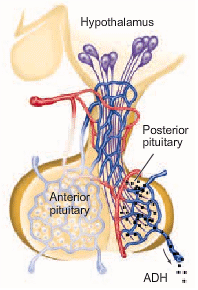Thirst and Water Retention
 If blood pressure decreases and/or blood osmolarity increases, the body responds by promoting water retention and triggering the sensation of thirst. The resulting water retention and water intake dilute the blood as they expand blood volume.
If blood pressure decreases and/or blood osmolarity increases, the body responds by promoting water retention and triggering the sensation of thirst. The resulting water retention and water intake dilute the blood as they expand blood volume.
An increase in osmolarity activates osmoreceptor neurons in the hypothalamus. In addition to promoting thirst, the osmoreceptors increase the release of antidiuretic hormone (ADH) from the posterior pituitary. ADH can act on cells of the collecting duct to insert aquaporins (water channels) into their plasma membranes. The aquaporins increase the permeability of these membranes to water, such that more water is reabsorbed from the collecting duct fluid and delivered to the interstitial spaces of the renal medulla and the bloodstream.

